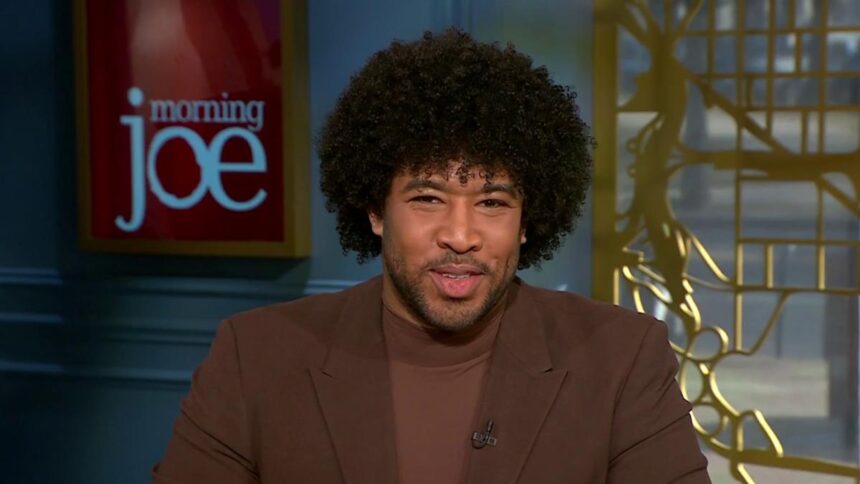In a milestone that echoes far beyond the television screen, Eugene Daniels has officially made history as the first openly queer Black anchor on MSNBC’s weekend programming. It’s a title that signifies more than just a promotion—it signals a powerful shift in American media, one where authenticity, representation, and journalistic integrity converge to reshape how stories are told and who gets to tell them.
For Daniels, this achievement is not just personal—it’s historic. His ascent within one of the nation’s leading cable news networks reflects broader societal changes, challenges long-standing barriers in political journalism, and opens doors for an entire generation of young journalists who see their identity as strength, not a stumbling block.
With a signature mix of sharp political insight, approachable charisma, and unwavering authenticity, Daniels isn’t just reporting the news. He’s redefining who the news is for—and who gets to shape its narrative.
A Voice from the Margins, Now Front and Center
Born and raised in Colorado, Eugene Daniels grew up acutely aware of his identity. As a Black, queer man navigating conservative spaces, Daniels often found himself underrepresented in media and culture. But instead of shrinking from that reality, he leaned into it—developing a keen interest in storytelling, social justice, and public policy from a young age.
He studied political science and journalism at Colorado State University and quickly became known for his ability to translate complex issues into compelling, accessible stories. His early career included work at local news outlets, covering community issues, state politics, and culture—before making a bold leap to the national stage.
That leap came in the form of Politico, where Daniels joined in 2018. It didn’t take long for him to make a mark.
Breaking Out at Politico and the Rise to National Recognition
At Politico, Daniels brought a fresh lens to the often-sterile world of political reporting. He didn’t just cover the horse race; he illuminated the people, policies, and power structures behind the headlines. His authenticity and intersectional approach to politics helped him rise quickly, ultimately becoming a co-author of the influential Playbook newsletter—a must-read briefing for Washington insiders.
What made Daniels stand out wasn’t just his writing or on-camera poise. It was the way he wove lived experience into his journalism. He spotlighted racial justice, LGBTQ+ rights, reproductive freedom, and youth activism long before they became dominant political themes. In a media landscape often criticized for lacking diversity of perspective, Daniels brought both depth and relatability.
He also quickly became a frequent guest on major news platforms, including MSNBC, CNN, and CBS, offering commentary that was both informed and unflinchingly honest. Viewers connected with his candor, and industry insiders took notice.
Joining MSNBC: A Natural Evolution
In 2021, Daniels officially joined MSNBC as a contributor and political analyst. He brought a nuanced, deeply researched voice to the network’s flagship programs like Morning Joe, The ReidOut, and Deadline: White House. As the 2024 presidential race loomed and issues of democracy, identity, and power surged to the forefront, Daniels’ insights became even more vital.
Then came the announcement that solidified his place in media history: Eugene Daniels would co-anchor MSNBC’s weekend political coverage, becoming the first openly queer Black journalist to do so.
The appointment was celebrated across journalistic and activist circles. Not just because of who Daniels is, but because of what he represents: a more inclusive future for broadcast journalism. A future where stories are told by those who understand them deeply—not just academically, but personally.
Representation That Resonates
Daniels’ presence on MSNBC’s weekend desk is seismic for several reasons. For decades, cable news has been dominated by straight, white male voices. While progress has been made, the inclusion of openly queer Black journalists in anchoring roles remains exceedingly rare.
Daniels is breaking that mold—not as a token, but as a talent. And for viewers from marginalized communities, his presence offers more than representation; it offers validation.
“I see myself in Eugene,” tweeted one young viewer. “Not just in how he looks, but in how he thinks, how he speaks, and how he cares.”
In an era when media trust is fragile and audiences crave authenticity, Daniels’ lived experience enhances his reporting. He brings empathy to stories of discrimination, nuance to policy debates, and moral clarity to national crises.
Style Meets Substance
Beyond his reporting acumen, Daniels is also known for his distinctive style. Whether it’s his perfectly tailored blazers, bold eyewear, or statement shoes, he brings personality and flair to a medium that has long prized neutrality.
But that style isn’t just aesthetic—it’s political. Daniels has spoken candidly about how dressing as his authentic self is an act of resistance in spaces that weren’t built for people like him. His fashion choices are as intentional as his journalism, signaling a rejection of conformity and an embrace of complexity.
He has become something of a fashion icon in political media circles, gracing magazine spreads, being profiled for his wardrobe, and earning accolades not just for his coverage—but for his courage.
Journalism with a Conscience
Daniels’ work consistently reflects a belief that journalism should not be detached from justice. While he adheres to the highest standards of fact-based reporting, he refuses to pretend that all viewpoints are equally valid in the face of racism, homophobia, or authoritarianism.
In a 2023 interview, he stated:
“Objectivity isn’t about both-sides-ing oppression. It’s about truth-telling. And sometimes the truth has a side.”
That perspective has drawn both praise and pushback. But Daniels is undeterred. In fact, his refusal to water down the truth has only strengthened his credibility—especially among younger, more diverse audiences who expect moral clarity from their media figures.
He continues to cover major political events with a balance of rigor and humanity—offering sharp analysis while centering the voices most impacted by the decisions made in Washington and beyond.
The Weekend Shift: What to Expect
Now anchoring MSNBC’s weekend political block, Daniels brings his signature reporting to a broader, national stage every Saturday and Sunday. The program blends traditional political news with longform interviews, cultural analysis, and stories often overlooked by weekday programming.
Segments include:
- “People & Power” – a spotlight on activists, organizers, and changemakers shaping local politics
- “Unscripted” – a commentary segment where Daniels unpacks the deeper meaning behind the week’s headlines
- “Table Talk” – roundtable discussions featuring journalists, artists, and thought leaders from underrepresented communities
Daniels has said his goal is to create a space where “politics feels less like a game show and more like something personal.” Early ratings show promising engagement, with viewers praising the show’s intelligence, emotional resonance, and cultural relevance.
A Broader Cultural Moment
Daniels’ rise comes amid a broader reckoning within American media. Calls for diversity, equity, and inclusion have pushed networks to rethink who sits at the anchor desk and who shapes the editorial agenda.
While representation alone isn’t a cure-all, it matters deeply. And Daniels’ success challenges newsroom leaders to move beyond symbolic hires and commit to structural change.
It also comes at a time when Black, LGBTQ+, and other marginalized communities face renewed political attacks—from book bans and voter suppression laws to anti-trans legislation and disinformation campaigns. In that context, Daniels’ voice is not just welcome—it’s necessary.
Mentorship and Impact Beyond the Screen
Daniels has made it a point to uplift others on his journey. He mentors young journalists, especially queer and BIPOC reporters entering the field. He frequently speaks at universities, journalism conferences, and nonprofit events—urging the next generation to “tell stories that matter, and tell them in your own voice.”
He’s also deeply involved in advocacy organizations that support press freedom, LGBTQ+ rights, and equitable media practices.
Though he’s now a household name in political media, Daniels has remained grounded—frequently citing his family, community, and colleagues as the pillars behind his success.
Looking Ahead
With the 2024 election behind him and 2025 shaping up to be a pivotal year in global politics, Daniels’ influence will only grow. As weekend anchor, political analyst, and cultural commentator, he occupies a unique position at the intersection of identity, power, and storytelling.
There’s speculation that he could one day host a daily primetime show or take on a leadership role in journalism advocacy. Whatever the future holds, one thing is clear: Eugene Daniels has changed the face of news—and the impact of that change will be felt for years to come.
Final Word: A Seat at the Table
For far too long, American media excluded voices like Eugene Daniels’. Today, he doesn’t just have a seat at the table—he’s shaping the conversation. And in doing so, he reminds us that the most powerful stories are the ones told with truth, empathy, and courage.
Daniels’ rise is not a footnote—it’s a turning point. A moment when a queer Black journalist didn’t just break barriers—he built a bridge for others to follow.









